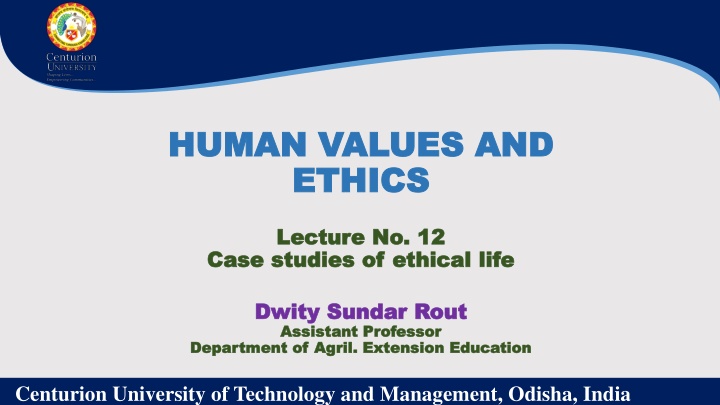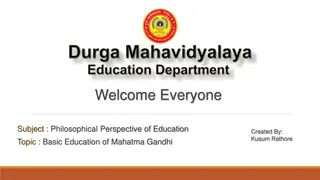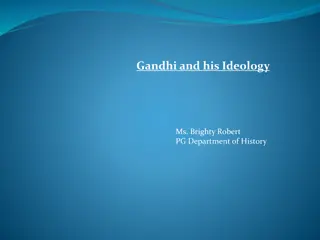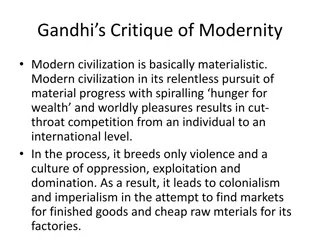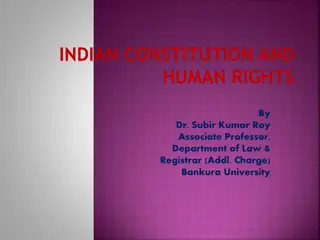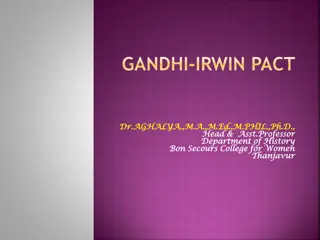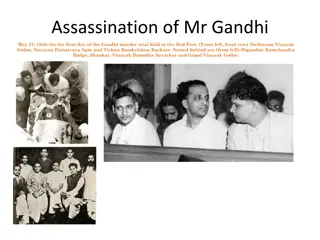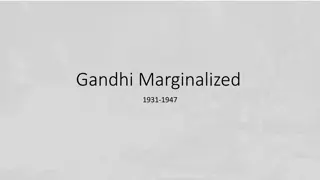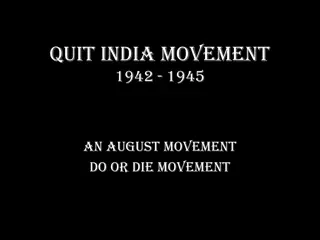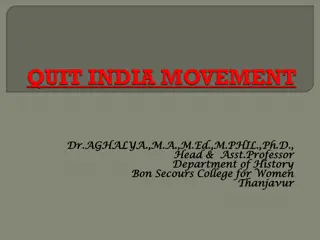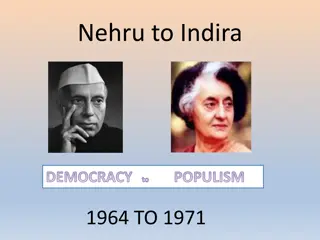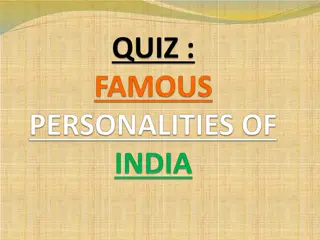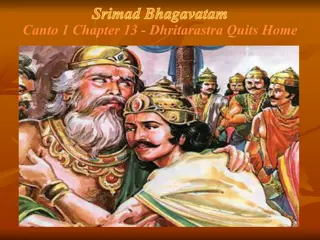Ethical Life of Mahatma Gandhi
Mahatma Gandhi, a key figure in India's independence movement, exemplified ethical values such as nonviolence, truth, simplicity, service to others, and more. His life was dedicated to principles that emphasized moral integrity, social justice, and environmental stewardship. Gandhi's commitment to nonviolence, honesty, and selfless service continues to inspire and guide individuals on the path of ethical living.
Download Presentation

Please find below an Image/Link to download the presentation.
The content on the website is provided AS IS for your information and personal use only. It may not be sold, licensed, or shared on other websites without obtaining consent from the author.If you encounter any issues during the download, it is possible that the publisher has removed the file from their server.
You are allowed to download the files provided on this website for personal or commercial use, subject to the condition that they are used lawfully. All files are the property of their respective owners.
The content on the website is provided AS IS for your information and personal use only. It may not be sold, licensed, or shared on other websites without obtaining consent from the author.
E N D
Presentation Transcript
HUMAN VALUES AND HUMAN VALUES AND ETHICS ETHICS Lecture No. 12 Lecture No. 12 Case studies of ethical life Case studies of ethical life Dwity Sundar Rout Dwity Sundar Rout Assistant Professor Assistant Professor Department of Department of Agril Agril. Extension Education . Extension Education Centurion University of Technology and Management, Odisha, India
Ethical life of Mahatma Gandhi Mahatma Gandhi, also known as Mohandas Karamchand Gandhi, was a prominent leader of the Indian independence movement against British rule. Throughout his life, Gandhi adhered to a strong ethical framework that guided his thoughts, actions, and philosophy. Some key aspects of Gandhi's ethical life are: Nonviolence, Truth and Honesty, Simplicity and Minimalism, Service to Others, Equality and Justice, Personal Discipline, Environmental Stewardship. Centurion University of Technology and Management, Odisha, India
Nonviolence Gandhi is best known for his principle of nonviolence, which he called Ahimsa. He believed in resolving conflicts through peaceful means and rejected the use of violence or harm towards others. Gandhi's commitment to nonviolence was a cornerstone of his philosophy and formed the basis for his approach to social and political activism. Centurion University of Technology and Management, Odisha, India
Truth and Honesty Gandhi valued truth and honesty in all aspects of life. He emphasized the importance of speaking the truth, even when it was difficult or unpopular. Gandhi believed that truth was a universal principle and that individuals should strive to align their actions with their beliefs and values. Centurion University of Technology and Management, Odisha, India
Simplicity and Minimalism Gandhi advocated for a simple and minimalistic lifestyle. He himself lived a modest life, wearing simple clothes and practicing self-restraint when it came to material possessions. Gandhi believed that excessive materialism and consumerism led to greed, inequality, and environmental degradation. He promoted a lifestyle focused on essential needs and a sense of contentment. Centurion University of Technology and Management, Odisha, India
Service to Others Gandhi dedicated his life to serving others and believed in the concept of selfless service. He encouraged individuals to work for the betterment of society and the upliftment of the marginalized. Gandhi famously said, "The best way to find yourself is to lose yourself in the service of others." He actively engaged in social and political activism, striving to address issues such as poverty, untouchability, and women's rights. Centurion University of Technology and Management, Odisha, India
Equality and Justice Gandhi fought against discrimination and inequality in all forms. He campaigned for the rights of the lower castes, women, and other marginalized groups in Indian society. Gandhi believed that every individual, regardless of their background, deserved equal respect, opportunities, and access to justice. Centurion University of Technology and Management, Odisha, India
Personal Discipline Gandhi emphasized the importance of personal discipline and self-control. He believed that by cultivating discipline within oneself, individuals could overcome their weaknesses and work towards self-improvement. Gandhi practiced fasting as a means of self-purification and as a form of nonviolent protest. Centurion University of Technology and Management, Odisha, India
Environmental Stewardship Gandhi recognized the importance of environmental sustainability and the need to protect nature. He emphasized the connection between human well-being and a healthy environment. Gandhi advocated for responsible and sustainable practices, such as conservation, waste reduction, and the use of renewable resources. Centurion University of Technology and Management, Odisha, India
Important to note While Gandhi was widely respected for his ethical principles, he was also a complex figure, and his views and actions were not without criticism or controversy. Nonetheless, his commitment to nonviolence, truth, simplicity, and service to others has left a lasting impact on the world and continues to inspire people in their pursuit of an ethical life. Centurion University of Technology and Management, Odisha, India
Ethical life of Mother Teresa Mother Teresa, born Anjez Gonxhe Bojaxhiu on August 26, 1910, in Skopje, now North Macedonia, was a Catholic nun who dedicated her life to serving the poor and needy. She is widely regarded as one of the most influential humanitarians of the 20th century and was awarded the Nobel Peace Prize in 1979. Throughout her life, Mother Teresa exemplified a strong commitment to ethical principles, which guided her work and interactions with others. Some key aspects of her ethical life are: Compassion and Empathy, Respect for Human Dignity, Selflessness and Sacrifice, Non-Judgmental Attitude, Commitment to the Value of Life, Faith and Spirituality. Centurion University of Technology and Management, Odisha, India
Ethical life of Dr. A. P. J. Abdul Kalam Dr. A. P. J. Abdul Kalam, the former President of India, was widely regarded as a man of great integrity and ethical values. Throughout his life, he demonstrated a strong commitment to honesty, humility, and social responsibility. Some aspects of his ethical life are: Integrity, Humility, Social Responsibility, Ethical Leadership and Commitment to Education. Centurion University of Technology and Management, Odisha, India
Ethical life of Lal Bahadur Sastri Lal Bahadur Shastri, born on October 2, 1904, and passed away on January 11, 1966, was an Indian politician and statesman who served as the second Prime Minister of India. He was known for his simplicity, integrity, and ethical conduct throughout his life. Throughout his tenure as Prime Minister, Shastri focused on policies that aimed to uplift the poor and marginalized sections of society. He promoted the concept of self-sufficiency in food production and initiated the famous "Green Revolution" in India. His commitment to ethical governance was evident in his emphasis on transparency, accountability, and the welfare of the common people. Centurion University of Technology and Management, Odisha, India
Ethical life of Anna Hazare Anna Hazare, born on June 15, 1937, is an Indian social activist known for his anti-corruption movement and advocacy for government transparency. Throughout his life, Hazare has demonstrated a strong commitment to ethical principles and has been recognized for his integrity and selflessness. Some key aspects of Anna Hazare's ethical life are: Anti-Corruption Movement, Commitment to Nonviolence, Simplicity and Personal Integrity, Service to Society and Personal Sacrifice. Centurion University of Technology and Management, Odisha, India
Ethical life of Anand Kumar Anand Kumar is an Indian mathematician and educator who gained prominence for his initiative, Super 30, which provides free coaching and support to economically disadvantaged students preparing for the highly competitive Indian Institutes of Technology (IIT) entrance examination. While I cannot provide real-time information about his current life or ongoing activities, I can speak about the known aspects of his ethical life up until my last knowledge update in September 2021. Anand Kumar's ethical life revolves around his commitment to promoting education and equal opportunities for all. Through Super 30, he has been instrumental in helping talented students from underprivileged backgrounds gain admission to prestigious institutions like the IITs. His work has received recognition both in India and internationally. some key aspects of Anand Kumar's ethical life are: Access to Education, Empowering the Marginalized, Transparency and Integrity, Social Impact, Inspiration and Role Model. Centurion University of Technology and Management, Odisha, India
Thank you Centurion University of Technology and Management, Odisha, India
